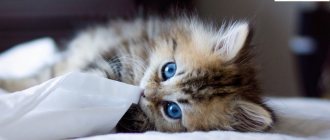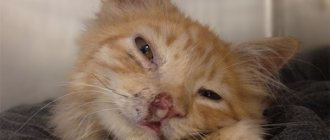As soon as you have acquired the long-awaited kitten, some problems immediately arise, one of which is the pet not sleeping at night. The owners are tired from the day and are sleeping, but he is awake, playing or meowing out of habit. First the cat meows to be let into the bedroom, then to be let out. During the day, people need to go to work or school, but the mustache goes to bed and rests until the evening. And there again...
Of course, young animals are naturally playful, but the kitten must be aware of the limits of its territory, as well as the limits of the master's bedroom. To do this, you need to know what the causes of cat insomnia are and how to deal with it.
Reasons why a cat doesn't sleep at night
To understand why a cat does not sleep at night, you need to realize that the biological clocks of the pet and the owner are significantly different:
- The first reason to understand why a kitten does not sleep at night is nature. According to their natural characteristics, cats are predators, and they tend to hunt at night. Pets living in rural areas walk excellently at night and sleep during the day, and this factor does not bother anyone. In the city, the situation is completely different. If the owner allows, the cat will calmly walk around the house at night, sometimes attracting attention to itself.
- It is a known fact that cats spend 18 hours a day sleeping, and naturally, during the day they sleep well, and at night they are full of energy, demanding attention and food.
- If a kitten has just arrived in the house and does not let you sleep at night, then you need to be patient a little, because it needs time to adapt to the new environment.
- If a cat is alone at home during the day, he experiences a lack of communication. He's just lonely. Naturally, he believes that night is the time when the owner could give him at least a little attention. The pet begins to invite him to play, demands affection and communication.
- The kitten might be hungry.
- Sometimes a cat is pushed to such night wakefulness by an unrealized sexual instinct.
- Excessively timid animals, which have been sitting in a secluded place during the day because of the arrival of guests or the activity of another animal located next to it, begin to meow at night and attract attention to themselves.
- Maybe something is bothering the cat, she may have health problems. After all, as you know, illnesses make themselves felt more strongly at night.
How to express your love for a cat?
If you want to show
If your cat
loves
, then it is enough for him that you feed him from your hands, not forgetting to pet him as often as possible. And if the cat turns over on its back and allows you to stroke its tummy, this indicates the highest degree of trust. Cats are not the hardest working animals.
Interesting materials:
How much alcohol can you import into the European Union? How much alcohol is in kefir? How many amps does a cigarette lighter need? How many Armenians are there in Ukraine 2022? How much aspirin per liter jar? How many aircraft carriers does China have? How many cars are registered in Uzbekistan? How many points are given for each exam task in geography? How many points do they give for G at universities? How many points are given for the final essay?
How to distinguish between a healthy night wakefulness and a sick pet
When a pet screams all night, doesn’t sleep and doesn’t let anyone do it, the caring owner wonders if something is bothering him. How to understand where he is healthy and asks for attention, and where he complains about his deplorable condition.
A sick animal, as a rule, meows with altered intonation. She begins to yelp or howl. He is always looking for a place, wants to climb somewhere, walks around the house and meows, cannot sit or lie down quietly.
Causes of lethargy
When an animal is sick, it becomes drowsy, aggressive, and lethargic. This condition is immediately noticeable in children, because when nothing bothers them, they love to jump and play.
There are several explanations why a kitten is lethargic.:
- disturbed sleep patterns, when the animal sleeps during the day and plays at night;
- sterilization;
- taking deworming tablets;
- tick bite;
- viral or infectious disease;
- taking antibiotics;
- heat;
- full stomach;
- poisoning;
- concussion.
Any medication, injections and operations can have side effects on the animal’s condition. Often the kitten is lethargic after deworming, which indicates an incorrect dosage or an advanced disease. If your cat feels unwell for more than two days, contact your veterinarian. Gastric lavage may be required.
In addition to the diseases listed, a kitten may be lethargic due to anemia, obesity, poisoning, metabolic disorders, or urolithiasis. A prolonged decrease in the cat's activity, loss of appetite, and avoidance of communication should alert you. You should not give your pet injections or pills yourself, as this may worsen his condition.
Solving the problem of a cat being awake at night
The solution to the problem lies not in making the cat sleep at night, but in how to wean him from sleeping during the daytime. It is impossible to force a cat to do anything due to its unique love of freedom. The only way out is to satisfy her needs and try to accustom her to the daily routine necessary for both parties:
- If your pet doesn't let you sleep at night, you can try feeding it late in the evening. It is advisable that the food be as high in calories as possible, because digesting it will require more strength and energy. And walking at night requires additional energy from the animal, and in order to save it for digesting food, it will rest and not interfere with its owners doing the same.
- When a cat cannot be put to sleep due to lack of attention, there is nothing left to do but give it this attention in the evening. If the pet is lonely, no one communicates with him during the day, then naturally, after the owner comes home from work, he will demand the attention he has not received. This is especially true for anxious animals; you just need to calm the cat down, pet it, talk to it. She will feel the care of her owner and will stop worrying at night.
- You need to follow natural instincts and let your pet walk around the territory. Sometimes he feels anxious and needs to make sure everything is okay. When the cat has walked around all the rooms before going to bed, he calmly goes to rest, making sure that nothing threatens him or his owner. If the appearance of an animal in any room is not desirable, then when walking around the space it is better not to go there at all. This way the cat will get used to it and will not become interested in this room.
- Another important component in revising your pet’s daily routine is physical activity. If the animal does not allow you to sleep at night, then in order to accustom it to the necessary routine, you need to play with it for as long as possible at night. It is better that he runs for at least an hour and a half. Moreover, it is important to play not only with toys, but also with the owner; after playing enough with candy wrappers and catch-up teasers, the pet will get tired and will be left “without its hind legs.” This way he will sleep until the morning.
- If the cat does not sleep at night and demands food, then you need to leave him some food at night, you can use an automatic feeder. But, if the animal begins to feed additionally at night, then the daily food intake should be reduced. This is necessary to prevent the cat from developing obesity.
- An extreme method is to try feeding your cat raw meat once a week. In this way, his hunting instincts will be satisfied, and digesting raw food will take more energy. Your pet will have no time for partying at night. Just don't do this too often.
- You can try to get another animal. During the day they will play much more actively, and it will be easier to train them to sleep at night without disturbing their owner.
- When all of the above methods have not given any result, then in order to calm the active mustache, you can give it the drug “Cat Bayun”. This medication is well suited both for unsatisfied sexual activity in a cat and for small kittens. The product is used twice a day, morning and evening. The drug "Cat Bayun" cannot be used frequently, it is only for emergency cases.
You can try not to react in any way to the cat’s cries at night; she will see that her actions are not producing any results and will stop bothering her owner at night.
How to solve a problem
The main way to get a cat to sleep at night is to let it get tired during the day. Play with your cat during the day if you are at home. If you work, build or buy a playground for your cat. Regularly - every 3-4 days - offer your pet new toys: this way the entertainment will not get boring.
Cats need communication, so you should pay attention to your pet. Even if you come home late at night, chat with your pet: pet, talk, treat him with a treat.
Also arm yourself with knowledge of cat instincts: a cat will not look for food at night if it ate from its belly at night. And after a good dinner, the hunter needs to conserve resources. Move your main meal to the evening.
If your cat still makes noise at night, don’t fall for such tricks. The pet is trying to attract attention and your reaction only reinforces this behavior. Control yourself and don't yell at the cat, even if it drops something.
What not to do when your kitten won't sleep at night
Sometimes owners driven to despair resort to not entirely humane methods in order to get at least a little peace:
- When a pet does not allow you to sleep at night, it happens that the owner, trying to calm the animal, locks it either in the bathroom or in another room. In this way, it will not be possible to accustom a cat to rest at night, because it will begin to run around and scream even more, not understanding why it was treated so unfairly.
- When the owner, dreaming of a night's sleep, sprays the pet with water, he, of course, gets the long-awaited rest, but not for long until he licks himself. He won’t do this for a long time, then the noise will start again. The cat does not feel guilty; such methods seem offensive to him.
- Sometimes the owner follows the cat’s lead and begins to play with it, caress it, and feed it. In no case should you act this way; she will get used to it, and then life will become even more fun.
You can try covering the windows in the house with heavy curtains at night, this way the morning will take longer for the cat, and the owner will have a little extra time to soak in bed.
When a healthy cat does not allow its owner to rest peacefully at night, this means that it cannot adapt to the human regime in any way, but lives under the influence of natural instincts. If the pet is not sleeping, then the owner must behave calmly and competently.
When a person behaves aggressively towards an animal, it will be even worse, firstly, the cat will be offended by such behavior and will become even more indignant about this. Secondly, everything that happens will only amuse him, because he has achieved what he wanted: the owner’s attention. Over time, cats will calm down and become less playful; you need to endure a little and retrain your pet to your rhythm of life.
What to do if the kitten is lethargic and constantly sleeps?
If your kitten is lethargic and sleeps constantly, there is no need to panic.
A healthy pet sleeps almost the whole day during the first month of life, waking up to eat and play a little. Adult cats are already awake 7-9 hours a day. They spend time playing, hunting and communicating with their owners. A cat may sleep constantly not only because of pain or loss of strength. Factors that influence sleep duration :
- heat, low atmospheric pressure;
- home comfort and calm atmosphere;
- high activity while awake;
- dense feeding of the pet;
- Age: Old cats and young kittens can sleep up to 20 hours a day.
If the kitten is active and eats well when it wakes up, there is no need to worry. Prolonged sleep is physiologically normal, since protein nutrition of animals requires long-term digestion.
Natural factors that increase sleepiness
Just like humans, cats can also be affected by external factors that cause them to sleep longer than usual, including:
- weather - when it’s cloudy and rainy outside, not only the owner, but also his pet begins to fall asleep;
- calm environment;
- feeling of satiety;
- fatigue after games, attention from guests or household members.
Other causes of increased sleepiness. Cats and kittens can sleep for long periods of time when the air pressure is low, for example during the summer heat or before rain. Increased sleepiness of the animal may also be associated with changes in hormonal levels.
Studies have shown that female kittens sleep longer than their more active brothers.
Features of dreams. Cats fall asleep slowly; from a state of drowsiness, they enter the deep sleep phase. Scientists claim that mustachioed striped animals are capable of dreaming. And the owners notice how their sleeping pets twitch, move their paws, and squeak in their sleep. Such animal behavior should not cause alarm among owners.
What diseases cause kittens to sleep for a long time?
Unfortunately, often the drowsiness of pets is not related to their physiological characteristics. Lethargy, decreased activity and too much sleep can be a sign of a number of dangerous diseases:
- parasite infestation; fleas, ticks, helminths;
- intoxication (food poisoning);
- intestinal obstruction;
- injuries: bruises, fractures, dislocations, sprains;
- urolithiasis;
- anemia;
- gastritis;
- leukemia;
- kidney inflammation;
- retroviral infection.
Associated symptoms. Typically, these diseases are accompanied by other alarming symptoms:
- weakness in the limbs;
- hyperthermia (increased body temperature);
- lack of appetite;
- refusal to drink;
- dry, rough nose;
- dullness and brittleness of wool;
- weight loss;
- lack of activity even during short-term wakefulness, while the awakened kitten does not play and does not respond to the owner’s calls.
All of the above changes are extremely dangerous for the kitten’s life and it is unlikely that he will be able to solve the problem with sleep. The situation requires the mandatory intervention of a veterinarian, competent diagnosis and treatment. Experts recommend not to hesitate and immediately seek professional help.
Source
After sterilization
In the first days after sterilization, the kitten is lethargic, eats little and sleeps constantly due to lack of strength and the effects of anesthesia. The animal needs to rest and gain strength after the stress it has experienced. Therefore, do not wake your pet, even if you think he needs to eat.
If the condition does not change for two days, you should consult a veterinarian. Perhaps the kitten has increased sensitivity to the components of anesthesia or an infection was introduced during sterilization.
If your cat tries to move and run after surgery, try to help and calm her down . Excessive activity can lead to injury and worsening of the condition.
Dangerous symptoms
A kitten that sleeps a lot, does not like to play active games, eats poorly and eats little, may be seriously ill. Pay attention to your pet and the presence of other pathological symptoms. Signs of the disease :
- dry and hot nose;
- refuses to drink;
- temperature, body tremors;
- loose stools;
- vomit;
- pallor of mucous membranes;
- dull coat;
- impaired coordination;
- giving up your favorite treats;
- lack of reaction to people, loud sounds, lights;
- dilated pupils;
- rapid breathing.
Any of the listed symptoms is considered a deviation from the norm. To understand why your pet has stopped playing, eating and drinking, you need to consult a veterinarian.
If you know that the cause of poor health is poisoning, rinse the kitten’s stomach and give activated charcoal. After these steps, go to the veterinary clinic.
Source











